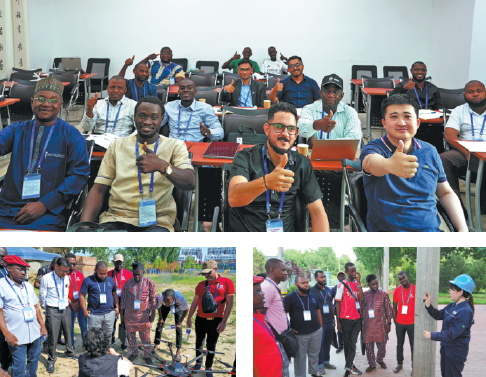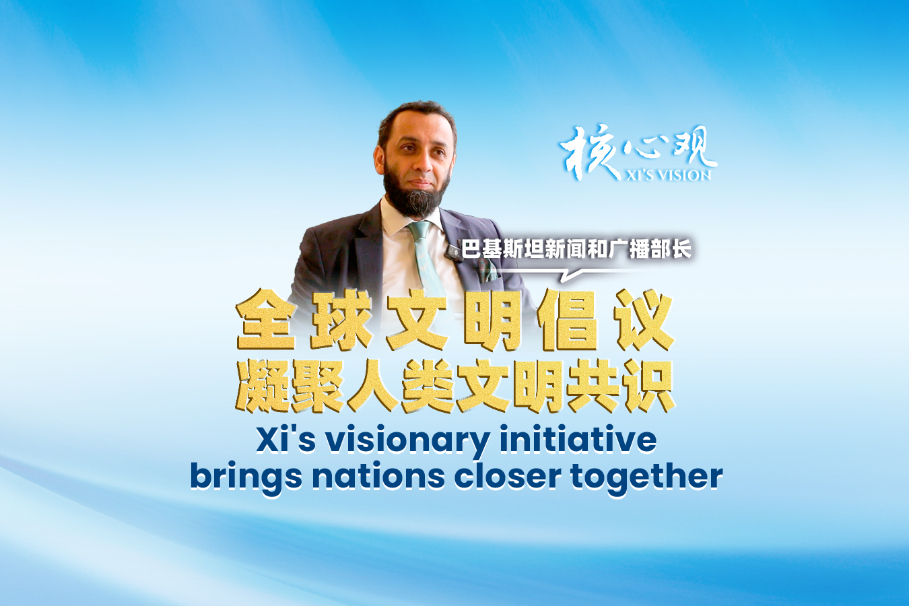China helps 'empower' developing nations
Baoding energy seminar focuses on adapting high-tech to new resources

Lamin K. Marong from The Gambia nearly missed his chance. When the nomination came for an energy seminar in China, he raced against the clock, filling forms and securing approvals.
"The medical certificate alone took me a lot of time and energy," recalled the 37-year-old senior energy expert of The Gambia's Ministry of Petroleum, Energy and Mines. "But I knew it would be worth it."
His determination mirrored the sentiments of 16 officials from Nepal, The Gambia, Nigeria, Cuba, Tanzania and Ethiopia who gathered at the Baoding Campus of North China Electric Power University in Baoding, Hebei province. They came seeking efficiency enhancement solutions to new energy power systems.
As the global energy transition accelerates, the power industry — which serves as the core hub of the energy system — plays a crucial role in achieving sustainable development for developing countries, said an official in the university.
Against this backdrop, China's Ministry of Commerce launched a foreign aid human resources development program, hosted by NCEPU.
The program aims to enhance the development of the power industry in developing nations through technical exchanges and experience-sharing, while strengthening collaboration and friendship between China and developing countries in the energy field, according to the university.
The three-week program, held from May 8 to 28, blended lectures on cutting-edge topics such as ultra-high-voltage transmission and battery storage systems with field visits to companies pioneering these technologies.
Professor Wang Fei, who taught courses on renewable energy power generation forecasting technology and demand response, tailored his lessons to fit diverse national realities. "Developing countries generally face the contradiction of abundant new energy resources but weak grid technology," he said.
According to Wang, his course focused on explaining how new energy power prediction and demand response technology can help scale up the development of new energy, reduce energy transition costs, and reduce wind and solar curtailment.
However, he faced a challenging question from the students during a class: "We come from diverse countries with vastly different national conditions, resource endowments, development levels, economic status, and policies. How can we effectively learn from and apply China's new energy power forecasting and demand response technologies? And how can we promote the adoption of these new technologies in our respective countries?"
"It's true," Wang said. "But developing countries can base their choices on resource endowments and infrastructure levels, and select corresponding technological pathways according to different scenarios."
Wang gave an example — in areas with abundant wind and solar resources such as the Sahel region in Africa and desert areas in the Middle East, priority could be given to introducing "wind-solar power prediction plus energy storage" technologies.
Many of the students from developing countries, Wang said, were very interested in learning how to apply China's advanced technologies in their own countries.
"The reason is that Chinese technologies are renowned for being low-cost and highly robust, which aligns well with the weak infrastructure and limited funds in developing countries," he said.
Moreover, China's technologies have significantly lowered the application threshold through "large-scale production plus localization substitution", leading to remarkable results in technology application, Wang added.
Marong said, "As a senior energy expert at the Ministry of Petroleum, Energy and Mines of The Gambia, I have always looked forward to enhancing my knowledge and understanding in the areas of energy efficiency enhancements and improvements within the power systems."
He added that the seminar has increased his understanding of energy efficiency improvements with power systems, which is in line with his job; it will enable him to channel the knowledge and skills he has gained to make an impact on the overall development of the power system in The Gambia.
"I hope to learn from China's experience and solve our issues. I also hope prominent Chinese companies can invest in The Gambia's power system to improve its reliability and sustainability, and ensure that we are energy secure as a nation through capacity development," Marong said.
He added that during the field visits, he had collected contacts from several Chinese companies.
"As a start, we would like to initiate memoranda of understanding between Chinese enterprises and their sister enterprises in The Gambia to chart a pathway for possible cooperation and collaboration in the future," Marong said.
Ethiopian engineer Ebsa Tesfa Hordofa, 33, also saw the seminar as a valuable opportunity to learn from China's experience.
"China has emerged as a global leader in the field of new energy, demonstrating remarkable progress with deployment, integration and innovation of renewable energy technologies," he said.
One particular visit resonated deeply with him — at a technical college in Baoding.
"I was especially struck by how theoretical concepts were brought to life through real hands-on laboratory setups," he said, adding that the simulations and the use of virtual reality in laboratories made the visit unforgettable.
He added that the students found the wind power operation, the simulation lab and the power cable distribution room exceptional. "It reflects China's strong commitment to preparing the next generation and maintaining an efficient and secure power system," Hordofa said.
Most importantly, he added, the experience has enhanced his technical skills and global outlook, enabling him to drive energy modernization and support sustainable development in his own country.
According to Hordofa, a critical challenge for his country is its heavy dependence on hydropower — over 90 percent — making the power system vulnerable to drought and environmental sustainability.
During the field visits, he found the modern, digital power system relay protection systems and battery storage systems amazing.
"These technologies that can enhance grid stability, support renewable integration and improve fault detection and system reliability can be directly applicable to my country," Hordofa said.

Today's Top News
- Germany vows to tackle people-trafficking to the UK
- Greek farmers fear fresh US tariff blow
- Global banks, institutions optimistic on China growth
- Chinese people's heroic victory praised
- Sichuan's ethnic festival attracts thousands of tourists
- Goal of high-tech self-reliance unchanged: China Daily editorial






























